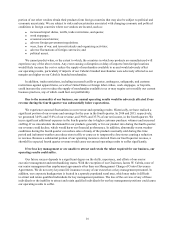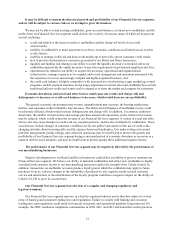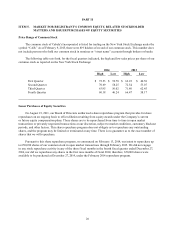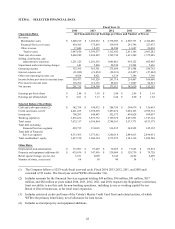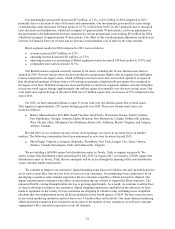Cabela's 2014 Annual Report Download - page 32
Download and view the complete annual report
Please find page 32 of the 2014 Cabela's annual report below. You can navigate through the pages in the report by either clicking on the pages listed below, or by using the keyword search tool below to find specific information within the annual report.22
of WFB were improper. As a result of these compliance examinations, the FDIC issued consent orders and WFB
was required to take corrective action and pay restitution and civil money penalties. WFB has resolved all consent
requirements and is not currently subject to any consent orders.
In addition, as a Visa member bank, WFB must comply with rules and regulations imposed by Visa. For
example, WFB and Cabela’s could be fined by Visa for failing to comply with Visa’s data security standards. Our
Financial Services segment, like our merchandising businesses, also faces cybersecurity risks. A security breach in
our Financial Services segment could have a material adverse impact on our business and results of operations.
The Dodd-Frank Wall Street Reform and Consumer Protection Act may impact the practices of our
Financial Services segment and could have a material adverse effect on our results of operations.
In July 2010, the Reform Act was signed into law. The Reform Act, as well as other legislative and regulatory
changes, could have a significant impact on us by, for example, requiring the Financial Services segment to change
its business practices, imposing additional costs on the Financial Services segment, limiting fees the Financial
Services segment can charge for services, impacting the value of the Financial Services segment and its assets,
or otherwise adversely affecting the Financial Services segment’s business. A description of the Reform Act and
other legislative and regulatory developments is contained in “Management’s Discussion and Analysis of Financial
Condition and Results of Operations - Developments in Legislation and Regulation.”
As directed by the Reform Act, the United States Government Accountability Office released a report on
January 20, 2012, that examines the potential implications of eliminating certain exceptions under the Bank
Holding Company Act of 1956, as amended (“BHCA”), including the exception for credit card banks. It is unclear
whether this report will lead to any additional legislative or regulatory action. If the credit card bank exception
were eliminated or modified, we may be required to divest our ownership of WFB unless we were willing and able
to become a bank holding company under the BHCA. Any such forced divestiture may materially adversely affect
our business and results of operations.
The Reform Act will also affect a number of significant changes relating to asset-backed securities, including
additional oversight and regulation of credit rating agencies and additional reporting and disclosure requirements.
In addition, the Reform Act will prohibit issuers and payment card networks from placing certain restrictions on
vendors relating to credit card transactions, which could affect consumer behavior and the use of credit cards as a
form of payment.
The Reform Act also established the Consumer Financial Protection Bureau (the “Bureau”) within the Federal
Reserve, a new consumer protection regulator. The Bureau has broad rulemaking and enforcement authority over
providers of credit, savings, and payment services and products, and WFB is subject to its regulation. While the
Bureau does not currently examine WFB, it receives information from the FDIC, WFB’s primary regulator. The
Bureau also has rulemaking and interpretive authority under existing and future consumer financial services laws
and supervisory, examination, and enforcement authority over institutions subject to its jurisdiction. The Bureau,
the FDIC, and other agencies have recently announced several high-profile enforcement actions against credit card
issuers for deceptive marketing and other illegal practices related to the advertising of ancillary products, collection
practices, and other matters. By these public enforcement actions, the Bureau and the FDIC have signaled a
heightened scrutiny of credit card issuers. We anticipate increased activity by regulators in pursuing consumer
protection claims going forward.
The Reform Act also limits the ability of federal laws to preempt state and local consumer protection laws.
This legislation could have a material adverse effect on WFB, for example, if a new consumer protection agency,
or state officials, were to impose new restrictions on risk management, pricing, disclosure, or other aspects of the
credit card business.
The Reform Act also requires fees charged for debit card transactions to be both “reasonable and
proportional” to the cost incurred by the card issuer. Although the Reform Act applies this restriction only to debit
cards, Congress has expressed its desire to regulate interchange fees for credit cards. From time to time, Congress






